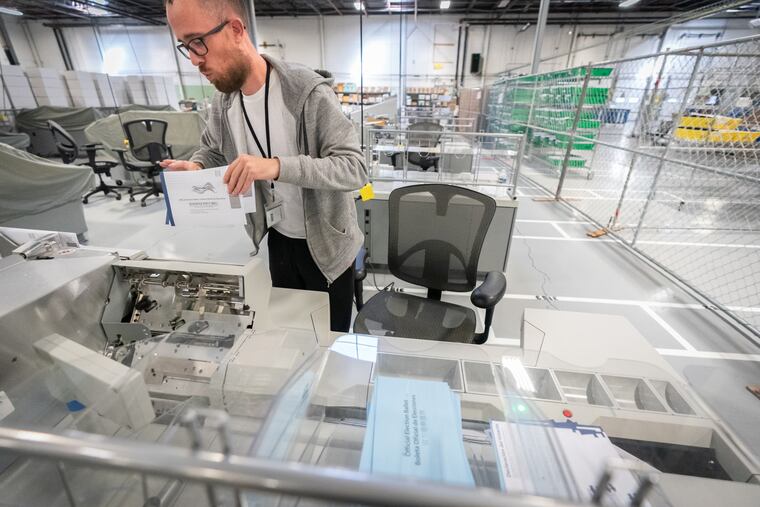Judge says it’s too late to force Philly to reinstate process for counting double votes
But in a withering opinion, Common Pleas Court Judge Anne Marie Coyle blasted city elections officials for ending what she described as a valuable fraud deterrence and detection procedure.

Philadelphia elections officials improperly scaled back a process they had used to catch possible double votes before they were counted, a city judge ruled Monday — but she did not order them to reinstate it, saying it was too close to Election Day to do so.
In a withering 13-page opinion, Common Pleas Court Judge Anne Marie Coyle said city elections officials had eliminated an important deterrent for potential fraud and risked damaging public confidence in the election results with their decision last week to postpone the process known as poll book reconciliation — a means of flagging mail ballots submitted by voters who also voted in person — until after votes were counted.
But an injunction requested by Republicans had “been filed too close in time to the upcoming general election,” Coyle said, explaining that requiring the city to reinstate the procedure just days before the count “would be detrimental to the efficient administration of the 2022 General Election” and “is not remotely feasible at this late date.”
The Republicans who sued the city, supported by a national GOP election law group formed by political strategist Karl Rove and former U.S. Attorney General Bill Barr, immediately appealed Coyle’s decision to Commonwealth Court.
“Philadelphia must protect the count’s integrity and assure the public of accurate results,” said David Lyons, president of that group, Restoring Integrity and Trust in Elections, in a statement. “As voters increasingly opt to vote by mail-in ballot, it is more critical to audit the ballots to guard against double voting.
Philadelphia’s poll book reconciliation process — which involves comparing poll book pages that track ballots cast at the polls for any potential overlap with mail ballots received just days before the election — identified only a few dozen accidental double votes in the 2020 elections and none in the three elections since. The procedure is time-consuming and labor-intensive work and requires officials to temporarily pause vote-counting to scan poll books.
So this year, city elections officials announced they intended to do what Pennsylvania’s other counties do: carry out the process after the count to speed up the tallying of votes.
The city’s three-member board of elections, the city commissioners, maintained that poll book reconciliation is no longer necessary and that state law doesn’t require them to do it during the vote count.
“As we all know, Philadelphia was the target of complaints about not canvassing ballots as quickly as other counties because we were going the extra mile,” Seth Bluestein, the sole Republican commissioner, said when the board approved its vote-counting procedures Wednesday. He attributed the lack of double votes in recent elections to increased voter familiarity with mail voting, better poll worker training, and improved procedures: “The results of those efforts demonstrate that this additional work is neither necessary nor helpful any longer.”
But Coyle, who was elected to the bench as a Republican, disagreed.
In her opinion Monday, she said Philly’s decision to conduct reconciliation after the vote count, instead of during it, conflicted with the city’s general duty under state law to catch wrongly cast votes and administer a proper election.
Coyle said she would have granted the Republicans’ request for an injunction, forcing the city to stick with what it had done before if the timing had not come so close to Election Day.
She blamed the commissioners for that poor timing, too, accusing them of purposely delaying the announcement of their plans.
They “failed to consider the harm to public perception of our electoral process that could reasonably result from [their] late date public announcement of their previously publicly touted poll book [reconciliation] process,” the judge wrote.
The commissioners have argued that the small number of double votes caught by the reconciliation process in 2020 weren’t the result of fraud but rather mistakes made by voters who were voting by mail for the first time and doing so during a pandemic.
They also maintained that they had to delay the reconciliation process until after the vote count this year or risk losing millions of dollars in new state funding.
The state legislature this summer created new funding for elections — and it comes with the requirement that counties count votes “without interruption” until they’re done. Philly accepted their $5.4 million share of that grant money, which meant the city is now subject to that continuous vote count requirement.
The city’s old method of pausing mid-count to conduct poll book reconciliation could jeopardize their access to those funds, the commissioners said.
Coyle rejected that argument, too, finding that elections officials had made no effort to check with the state to determine whether halting the vote count for poll book reconciliation would put the funding at risk.
